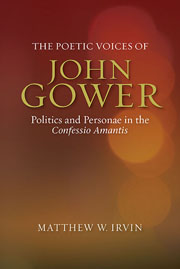Book contents
- Frontmatter
- Contents
- Dedication
- Acknowledgements
- List of Abbreviations
- Introduction: Making and Doing Love
- 1 The Inheritance of the Confessio Amantis
- 2 The Orientation of the Prologue to the Confessio Amantis
- 3 Amorous Persons
- 4 Pity and the Feminine
- 5 Labor and Art
- 6 Alienation and Value
- 7 The Love of Kings
- Conclusion: Identifying Amans
- Bibliography
- Index
- VOLUMES ALREADY PUBLISHED
Introduction: Making and Doing Love
Published online by Cambridge University Press: 05 March 2014
- Frontmatter
- Contents
- Dedication
- Acknowledgements
- List of Abbreviations
- Introduction: Making and Doing Love
- 1 The Inheritance of the Confessio Amantis
- 2 The Orientation of the Prologue to the Confessio Amantis
- 3 Amorous Persons
- 4 Pity and the Feminine
- 5 Labor and Art
- 6 Alienation and Value
- 7 The Love of Kings
- Conclusion: Identifying Amans
- Bibliography
- Index
- VOLUMES ALREADY PUBLISHED
Summary
John Gower's Confessio Amantis is a poem about love. Amans, its love-struck protagonist, supposedly represents the young Gower, who once wrote “les fols ditz d'amour” (silly songs of love; MO 27340). Gower's own experience in love, as he argues in Book I of the Confessio, qualifies him to discuss love's place in the world. The proper place of love, and the lover, is the concern of this book.
Part of that concern involves political prudence. Poems about love were poems for young men, and when Gower was writing the Confessio young men were in political power. Gower's dedicatees, Richard II and Henry of Derby (the future Henry IV), were almost exactly the same age, and both had a large number of young, powerful nobles and ecclesiastics in their service and their circle. Richard's preference for youthful compatriots is one of the many reasons history (and Gower himself, in the Cronica Tripertita) will give for his fall; but Henry too relied on many young men (including Richard Neville, the Beauforts, and Thomas Langley). Gower is interested in how fin amour, the discourse and the practice of noble love, affects the prudence of rulers and their advisors in their public action.
Another part of that concern involves art. Fin amour is itself an art, the ars amatoria, and is often communicated through poetry, another (related) art. The poetic art of love produces pleasure in readers through stimulation of affects and desire, but it is not immediately clear what virtues ground this art.
- Type
- Chapter
- Information
- The Poetic Voices of John GowerPolitics and Personae in the Confessio Amantis, pp. 1 - 6Publisher: Boydell & BrewerPrint publication year: 2014



